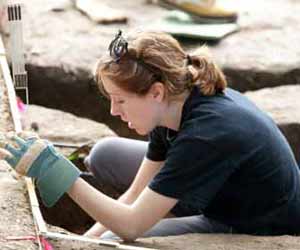Archaeology Significance
Archaeology can be a fascinating, fun, and even adventurous hobby or career. But it also holds a more important place in society than many people realize. Not only is it important for historical research, it also has a great deal of community and economic value. Archaeology has the potential to provide new information on the human past, solidify one’s ties to their social or national heritage, and provide economic means to locations all across the world.

Educational Importance
One of archaeology’s most important qualities is that it provides historical information on past societies from which we have no written documents. Some societies in the world only have written history for a few millennia, while historical records from other societies, such as those of the Americas, only go back for perhaps five hundred years. Without archaeological investigation, the history of these societies would certainly remain a mystery to us in the present day.
Why do we care, aside from the fact that we are totally fascinated by such historical treasures as Inca mummies and Stonehenge? Because, although it may be very different in many ways, modern society is a direct descendant of past societies. Through archaeology, we have the potential to learn a great deal about who we once were and who we are now as a result.
Archaeology can also help to provide information on groups that have often been neglected in traditional historical accounts, such as ethnic minorities, women, and the working class. As a result, archaeological investigation has the potential to provide new insights on the past and to reshape our understanding of history.
Community Importance
Archaeology has the ability to bring communities together in a variety of meaningful ways. Through archaeology, one’s national, cultural, and ethnic identity can be preserved and solidified. A rural North American community, for example, might feel a sense of historical kinship based on the unearthing of a colonial French trading post in their town. Native inhabitants of the Yucatan Peninsula, on the other hand, often feel a strong sense of pride when they gaze at the enormous temples that have been left behind by their ancient Mayan ancestors. All across the world, from nations to ethnic groups to small communities, archaeology has the ability to unite people of a common heritage in ways that nothing else can.
Economic Importance
There’s no doubt about it, archaeology is tremendously important to the world tourism industry. Families and friends from all over the world flock yearly to such iconic sites as the pyramids in Egypt, the temples in Greece, Machu Picchu in Peru, and the Great Wall in China. Museums fill up on a daily basis with curious visitors anxious to peer at the archaeological collections on display. As a result, there are local, regional, and national economies all over the world that thrive on the economic benefits that archaeological tourism produces.
While this is all well and good, the industry of archaeological tourism is not without its faults. Professional archaeology and the tourism industry share an uneasy existence. While archaeologists often rely on tourism to fund their research efforts, there is a great deal of concern in the field regarding the preservation of sites that are frequented by curious and often careless visitors, and the common dissemination of historical inaccuracies by the tourism industry to make an archaeological site more interesting and coherent for the general public. For more on the conflict between archaeology and tourism, see our “Issues in Archaeology” page.


 Teach English in Asia
Teach English in Asia  Cruise Ship Jobs
Cruise Ship Jobs  Alaska Fishing Industry Jobs
Alaska Fishing Industry Jobs  Sharing Economy / Gig Economy
Sharing Economy / Gig Economy